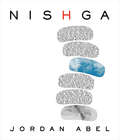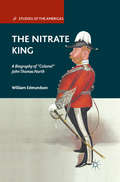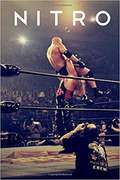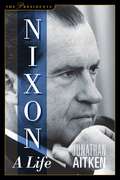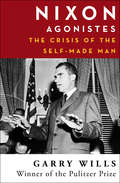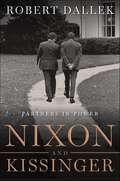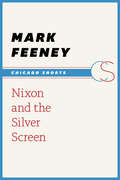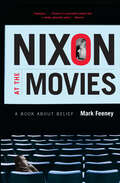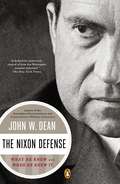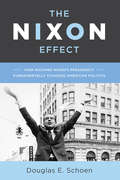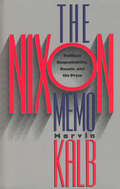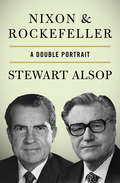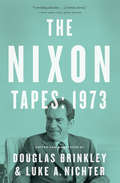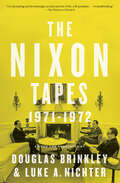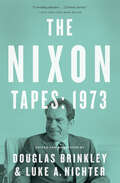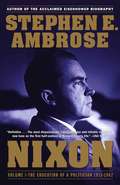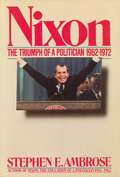- Table View
- List View
NISHGA
by Jordan AbelFrom Griffin Poetry Prize winner Jordan Abel comes a groundbreaking, deeply personal, and devastating autobiographical meditation that attempts to address the complicated legacies of Canada's residential school system and contemporary Indigenous existence.As a Nisga'a writer, Jordan Abel often finds himself in a position where he is asked to explain his relationship to Nisga'a language, Nisga'a community, and Nisga'a cultural knowledge. However, as an intergenerational survivor of residential school--both of his grandparents attended the same residential school--his relationship to his own Indigenous identity is complicated to say the least.NISHGA explores those complications and is invested in understanding how the colonial violence originating at the Coqualeetza Indian Residential School impacted his grandparents' generation, then his father's generation, and ultimately his own. The project is rooted in a desire to illuminate the realities of intergenerational survivors of residential school, but sheds light on Indigenous experiences that may not seem to be immediately (or inherently) Indigenous. Drawing on autobiography and a series of interconnected documents (including pieces of memoir, transcriptions of talks, and photography), NISHGA is a book about confronting difficult truths and it is about how both Indigenous and non-Indigenous peoples engage with a history of colonial violence that is quite often rendered invisible.
Nissim Ezekiel
by Shakuntala BharvaniLife and works of Nissim Ezekiel, noted Indian English writer (1924 - 2004).
Nissim Ezekiel Remembered
by Havovi Anklesaria Santan RodriguesNissim Ezekiel Remembered has a panoramic scope. It is designed for the general reader and for students of Indian writing in English.
Nitidharma Athva Dharmaniti
by M. K. Gandhiઆ પુસ્તકમાં ગાંધીજીએ નીતિ અને ધર્મ વિશે વિચારો રજુ કર્યા છે.
Nitinikiau Innusi: I Keep the Land Alive (Contemporary Studies on the North #7)
by Tshaukuesh Elizabeth PenashueLabrador Innu cultural and environmental activist Tshaukuesh Elizabeth Penashue is well-known both within and far beyond the Innu Nation. The recipient of a National Aboriginal Achievement Award and an honorary doctorate from Memorial University, she has been a subject of documentary films, books, and numerous articles. She led the Innu campaign against NATO’s low-level flying and bomb testing on Innu land during the 1980s and ’90s, and was a key respondent in a landmark legal case in which the judge held that the Innu had the “colour of right” to occupy the Canadian Forces base in Goose Bay, Labrador. Over the past twenty years she has led walks and canoe trips in nutshimit, “on the land,” to teach people about Innu culture and knowledge. Nitinikiau Innusi: I Keep the Land Alive began as a diary written in Innu-aimun, in which Tshaukuesh recorded day-to-day experiences, court appearances, and interviews with reporters. Tshaukuesh has always had a strong sense of the importance of documenting what was happening to the Innu and their land. She also found keeping a diary therapeutic, and her writing evolved from brief notes into a detailed account of her own life and reflections on Innu land, culture, politics, and history. Beautifully illustrated, this work contains numerous images by professional photographers and journalists as well as archival photographs and others from Tshaukuesh’s own collection.
The Nitrate King
by William EdmundsonWilliam Edmundson examines the spectacular life story of 'Colonel' John Thomas North, also known as 'The Nitrate King,' a mechanic in Leeds who became one of the best-known and richest men of his time. Forgotten in Britain and vilified in Chile and Peru, this is the first biography of a controversial but compelling figure.
NITRO: The Incredible Rise and Inevitable Collapse of Ted Turner's WCW
by Guy Evans<p>In April 1999, Entertainment Weekly asked its readers what many Americans were surely wondering to themselves: how did wrestling get so big? <p>As a consequence of the heated ratings competition between World Championship Wrestling (WCW) and the World Wrestling Federation (WWF), the spectacle had taken over Monday nights on prime-time cable television. But in a departure from the family-friendly programming produced by the last industry boom - the 1980s wave, which made household names of Hulk Hogan, 'Rowdy' Roddy Piper and Andre the Giant - the new era of wrestling combined stunning athleticism with a raunchy sex appeal, engrossing story lines and novel production techniques that reflected a changing society and its shifting values. <p>Once again, wrestling was a ubiquitous phenomenon - only this time, it seemed as though the fad would never end. With both WCW and WWF expanding into other forms of entertainment - movies, video games, music and the like - the potential for growth appeared to be limitless. <p>But with uncertainty surrounding its corporate future, and increasingly uninspired programming eroding its audience, WCW stood on the verge of collapse. Three years into a five-year plan devised by its charismatic leader - a former Blue Ribbon Foods salesman named Eric Bischoff - the company whose unexpected ascension initiated the entire boom was operating on borrowed time. <p>For by the end of the five-year plan, WCW ceased to exist. <p>But NITRO is a story about much more than WCW and the Monday Night Wars. It is a story of an era, a time in which the media and cultural landscape precipitated - and later supported - pro wrestling's mainstream popularity. It is a story of how a company made in the image of an intuitively brilliant risk-taker betrayed its original promise. It is a story of how a handful of men, each struggling with their own limitations, facilitated a public obsession that changed television forever. <p>And so, with the inside knowledge of a journalist, the perspective of a historian, and the passion of a fan, author Guy Evans provides a fresh look at an unfortunate inevitability - the downfall of World Championship Wrestling. Bolstered by exclusive interviews with over 120 former TBS and WCW employees, NITRO is the definitive picture of the last wrestling boom. </p>
El nivel alcanzado: Notas sobre libros y autores extranjeros
by Ignacio EchevarríaUn recorrido por la obra de los grandes autores de la literatura occidental de la mano del crítico más riguroso y polémico de nuestro país. Este volumen recoge una selección de reseñas, artículos, conferencias y prólogos sobre libros y autores «extranjeros» escritos en el transcurso de tres décadas. El conjunto da cuenta de una gran diversidad de intereses, que se proyectan en diferentes épocas, tradiciones y géneros. De Lawrence Sterne a V.S. Naipaul, pasando por Stendhal, Musil, Kipling, Malraux, Gombrowicz, Canetti o Iris Murdoch; de William Hazlitt a George Steiner, pasando por Walter Benjamin o Raymond Williams, los nombres aquí reunidos son otros tantos hitos de la particular cartografía que Ignacio Echevarría ha ido configurando como lector conforme desarrollaba su actividad como crítico y editor. Decía Robert Musil que la crítica es «una interpretación de la literatura que se traspone en interpretación de la vida, yuna celosa custodia del nivel alcanzado». De estas palabras se desprende el título de este volumen, del que Andreu Jaume, responsable de la edición, dice en su prólogo que «es mucho más que una simple recopilación de reseñas y ensayos sobre autores y obras en lenguas extranjeras. Su contenido puede analizarse a la luz de lo que fue la lectura paralela que Ignacio Echevarría hizo en su día de la literatura española publicada desde la Transición. La constelación de autores que aquí se reúne no es tanto un canon personal como un compromiso de ambición a la vez moral, política y estética». Cromos Mariposas amarillas Imaginar el mundo Una habitación compartida
Nixon: A Life (The Presidents)
by Jonathan AitkenThe rise, fall, and rebirth of Richard Nixon is perhaps the most fascinating story in American politics--and perhaps the most misunderstood. Nixon: A Life is the first entirely objective biography of Richard Nixon. Former British Defense Minister Jonathan Aitken conducted over sixty hours of interviews with the impeached former president and was granted unprecedented access to thousands of pages of Nixon’s previously sealed private documents. Nixon reveals to Aitken why he didn’t burn the Watergate tapes, how he felt when he resigned the presidency, his driving spiritual beliefs, and more. Nixon: A Life breaks important new ground as a major work of political biography, inspiring historians to recognize the outstanding diplomatic achievements of a man whose journey from tainted politician to respected foreign policy expert and elder statesman was nothing short of remarkable.
Nixon Agonistes: The Crisis of the Self-Made Man
by Garry WillsFrom one of America's most distinguished historians comes this classic analysis of Richard Nixon. By considering some of the president's opinions, Wills comes to the controversial conclusion that Nixon was actually a liberal. Both entertaining and essential, Nixon Agonistes captures a troubled leader and a struggling nation mired in a foolish Asian war, forfeiting the loyalty of its youth, puzzled by its own power, and looking to its cautious president for confidence. In the end, Nixon Agonistes reaches far beyond its assessment of the thirty-seventh president to become an incisive and provocative analysis of the American political machine.
Nixon Agonistes: The Crisis of the Self-Made Man
by Garry WillsWith a new preface: A “stunning” analysis of the troubled Republican president by the Pulitzer Prize–winning author of Lincoln at Gettysburg (The New York Times Book Review). In this acclaimed biography that earned him a spot on Nixon’s infamous “enemies list,” Garry Wills takes a thoughtful, in-depth, and often “very amusing” look at the thirty-seventh US president, and draws some surprising conclusions about a man whose name has become synonymous with scandal and the abuse of power (Kirkus Reviews). Arguing that Nixon was a reflection of the country that elected him, Wills examines not only the psychology of the man himself and his relationships with others—from his wife, Pat, to his vice-president, Spiro Agnew—but also the state of the nation at the time, mired in the Vietnam War and experiencing a cultural rift that pitted the young against the old. Putting his findings into moral, economic, intellectual, and political contexts, he ultimately “paints a broad and provocative landscape of the nation’s—and Nixon’s—travails” (The New York Times). Simultaneously compassionate and critical, and raising interesting perspectives on the shifting definitions of terms like “conservative” and “liberal” over recent decades, Nixon Agonistes is a brilliant and indispensable book from one of America’s most acclaimed historians.
Nixon and Kissinger: Partners in Power
by Robert DallekIn this epic dual biography, one of our most distinguished scholars—the bestselling author of An Unfinished Life—probes the lives and times of two unlikely leaders whose partnership dominated American and world affairs and changed the course of historyRichard Nixon and Henry Kissinger were two of the most compelling, contradictory, and important leaders in America in the second half of the 20th century. Both were largely self-made men, brimming with ambition, driven by their own inner demons, and often ruthless in pursuit of their goals. Tapping into a wealth of recently declassified documents and tapes, Robert Dallek uncovers fascinating details about Nixon and Kissinger’s tumultuous personal relationship—their collaboration and rivalry—and the extent to which they struggled to outdo each other in the reach of foreign policy achievements. He also brilliantly analyzes their dealings with power brokers at home and abroad, including the nightmare of Vietnam, the brilliant opening to China, détente with the Soviet Union, the Yom Kippur War in the Middle East, the disastrous overthrow of Allende in Chile, and growing tensions between India and Pakistan, while recognizing how both men were continually plotting to distract the American public’s attention from the growing scandal of Watergate. Authoritative, illuminating, and deeply engrossing, Nixon and Kissinger provides a shocking new understanding of the immense power and sway these two men held in affecting world history.
Nixon and the Silver Screen
by Mark FeeneyRichard Nixon and the film industry arrived in Southern California in the same year, 1913. In Nixon and the Silver Screen, Mark Feeney offers a new and often revelatory way of thinking about one of our most controversial presidents: by looking not just at Nixon's career--but Hollywood's. Nixon viewed more movies while in office than any other president, and Feeney argues that Nixon's story, both in politics and in his personal life, is nothing if not quintessentially American. Bearing in mind the events that shaped his presidency from 1969 to 1974, Feeney sees aspects of Nixon's character--and the nation's--refracted and reimagined in the more than 500 films Nixon watched during his tenure in the White House. The verdict? Nixon's legacy, for better or worse, is forever representative of the "Silver Age" in Hollywood, shaping and being shaped by that flickering silver screen.
Nixon at the Movies: A Book about Belief
by Mark FeeneyWas it an omen? Richard Nixon and the film industry arrived in Southern California in the same year, 1913. As Mark Feeney relates in this unusual and unusually absorbing book, Nixon and the movies have shared a long and complex history. Some of that historyOCothe president's multiple screenings of "Patton" before and during the invasion of Cambodia, or Oliver Stone's "Nixon"OCois well known. Yet much more is not. How many are aware, for example, that Nixon was an enthusiastic filmgoer who watched more than five hundred movies during his presidency? "Nixon at the Movies" takes a new and often revelatory approach to looking at Nixon's careerOCoand Hollywood's. From the obvious ("All the President's Men") to the less so (Elvis Presley movies and Nixon's relationship to '60s youth culture) to several onscreen alternate Nixons (Fred MacMurray in "Double Indemnity," Tony Curtis in "The Sweet Smell of Success," Gene Hackman in "The Conversation"), Feeney sees aspects of Nixon's character, and the nation's, refracted and reimagined in film. Conversely, Feeney argues that Nixon can help us see the movies in a new light, making a strong case for Nixon as the movies' tutelary deity during the early '70s, playing a role in Hollywood's Silver Age comparable to FDR's during its Golden Age. Stylishly written and bracingly eclectic, "Nixon at the Movies" draws on biography, politics, cultural history, and film criticism to show just how deeply in the twentieth-century American grain lies the pair of seemingly incongruous nouns in its title. As Nixon once remarked to Garry Wills: Isn't that a hell of a thing, that the fate of a great country can depend on camera angles?"
The Nixon Defense
by John W. DeanBased on Nixon's overlooked recordings, New York Times bestselling author John W. Dean connects the dots between what we've come to believe about Watergate and what actually happened Watergate forever changed American politics, and in light of the revelations about the NSA's widespread surveillance program, the scandal has taken on new significance. Yet remarkably, four decades after Nixon was forced to resign, no one has told the full story of his involvement in Watergate. In The Nixon Defense, former White House Counsel John W. Dean, one of the last major surviving figures of Watergate, draws on his own transcripts of almost a thousand conversations, a wealth of Nixon's secretly recorded information, and more than 150,000 pages of documents in the National Archives and the Nixon Library to provide the definitive answer to the question: What did PresidentNixon know and when did he know it? Through narrative and contemporaneous dialogue, Dean connects dots that have never been connected, including revealing how and why the Watergate break-in occurred, what was on the mysterious 18 1/2 minute gap in Nixon's recorded conversations, and more. In what will stand as the most authoritative account of one of America's worst political scandals, The Nixon Defense shows how the disastrous mistakes of Watergate could have been avoided and offers a cautionary tale for our own time.
The Nixon Defense: What He Knew and When He Knew It
by John W. DeanBased on Nixon's overlooked recordings, New York Times bestselling author John W. Dean connects the dots between what we've come to believe about Watergate and what actually happened Watergate forever changed American politics, and in light of the revelations about the NSA's widespread surveillance program, the scandal has taken on new significance. Yet remarkably, four decades after Nixon was forced to resign, no one has told the full story of his involvement in Watergate. In The Nixon Defense, former White House Counsel John W. Dean, one of the last major surviving figures of Watergate, draws on his own transcripts of almost a thousand conversations, a wealth of Nixon's secretly recorded information, and more than 150,000 pages of documents in the National Archives and the Nixon Library to provide the definitive answer to the question: What did PresidentNixon know and when did he know it? Through narrative and contemporaneous dialogue, Dean connects dots that have never been connected, including revealing how and why the Watergate break-in occurred, what was on the mysterious 18 1/2 minute gap in Nixon's recorded conversations, and more. In what will stand as the most authoritative account of one of America's worst political scandals, The Nixon Defense shows how the disastrous mistakes of Watergate could have been avoided and offers a cautionary tale for our own time.From the Trade Paperback edition.
The Nixon Defense
by John W. DeanBased on Nixon's overlooked recordings, New York Times bestselling author John W. Dean connects the dots between what we've come to believe about Watergate and what actually happened Watergate forever changed American politics, and in light of the revelations about the NSA's widespread surveillance program, the scandal has taken on new significance. Yet remarkably, four decades after Nixon was forced to resign, no one has told the full story of his involvement in Watergate. In The Nixon Defense, former White House Counsel John W. Dean, one of the last major surviving figures of Watergate, draws on his own transcripts of almost a thousand conversations, a wealth of Nixon's secretly recorded information, and more than 150,000 pages of documents in the National Archives and the Nixon Library to provide the definitive answer to the question: What did President Nixon know and when did he know it? Through narrative and contemporaneous dialogue, Dean connects dots that have never been connected, including revealing how and why the Watergate break-in occurred, what was on the mysterious 18 1/2 minute gap in Nixon's recorded conversations, and more. In what will stand as the most authoritative account of one of America's worst political scandals, The Nixon Defense shows how the disastrous mistakes of Watergate could have been avoided and offers a cautionary tale for our own time.
The Nixon Effect
by Douglas E. SchoenThe Nixon Effect examines the 37th president's political legacy in broad-ranging ways that make clear, for the first time, the breadth and duration of his influence on American political life. The book argues that Nixon is the key political figure in postwar American politics in multiple ways, some barely acknowledged until now. His legacy includes a generational shift in the ideological orientations of both the Republican and Democratic parties; the Nixon influence, both intentional and unintentional, was to push both parties further out to their ideological poles. So stark was Nixon's influence on party identities that it shaped the hardened partisan polarization in Washington today and the evolution of what has come to be called Red and Blue America.Stemming in part from this, and also from Nixon's scorched-earth political warfare and eventually his Watergate scandal, we have also seen the evolution of politics as war, where adversaries and ideological opponents are seen as evil or unpatriotic. Finally, Nixon's pioneering tactics-from the identification of the Silent Majority to the Southern Strategy, from "triangulating" between both parties and claiming the political center to launching the culture war with attacks on "elites" in media, academia, and the courts-have shaped political communications and strategy ever since.Other books have argued for Nixon's importance, but Douglas E. Schoen's is the first to take into account the full range of this fascinating man's influence. While not discounting Nixon's many misdeeds, Schoen treats his presidency and its importance with the seriousness-and evenhandedness-that the subject deserves.
The Nixon Memo: Political Respectability, Russia, and the Press
by Marvin KalbAn absorbing example of political journalism, The Nixon Memo is a case study of Richard Nixon's relentless quest for political rehabilitation. At issue is the key role of this former president of the United States (best known for his involvement in the famous "watergate" scandal) in the post-cold war debate about aiding Russia in its uncertain revolution. The story begins on March 10, 1992. Nixon had written a private memo critical of president George Bush's policy toward Russia. The memo leaked and exploded on the front page of The New York Times. Why would Nixon attack Bush, a fellow party member fighting for re-election? Why on an issue of foreign affairs, which was Bush's strength? The questions are as intriguing as the answers, and distinguished journalist and scholar Marvin Kalb offers a suspenseful, eye-opening account of how our conventional wisdom on United States foreign policy is shaped by the insider's game of press/politics. This story of Nixon's Machiavellian efforts to pressure the White House, by way of the press, into helping Boris Yeltsin and Russia sheds new light on the inner workings of the world inside the government of the United States. Marvin Kalb read the documents behind the Nixon memo and interviewed scores of journalists, scholars, and officials in and from Washington and Moscow. Drawing on his years of experience as a diplomatic correspondent, he identifies and illuminates the intersection of press and politics in the fashioning of public policy. "An absorbing and often compelling argument that Richard Nixon directed his own political rehabilitation on the world stage, using presidents, lesser politicians, and the press as his supporting cast. This is a first-class job of unraveling a complex and usually unseen tapestry."—Ted Koppel "With Marvin Kalb's captivating account, Richard Nixon continues to fascinate us even in death."—Al Hunt
Nixon & Rockefeller: A Double Portrait
by Stewart AlsopA fascinating analysis of two of the most important figures in 1960s American politics, written during their battle for the GOP presidential nomination. Richard Milhous Nixon was one of the most controversial politicians in America's history: a California congressman, senator, vice president, and president who was forced to resign his position as US Chief Executive because of his role in the scandalous Watergate affair. Nelson Rockefeller was the scion of a phenomenally wealthy American family and longtime governor of New York State. In 1960 they were the leading contenders to win the Republican Party's nomination for president of the United States, one of whom would face the Democratic challenger, Senator John F. Kennedy, in November's general election. Written by acclaimed journalist Stewart Alsop during the heat of the political race to the Republican Convention, Nixon & Rockefeller provides a revealing, often surprising dual portrait of two giants of twentieth-century American politics. Alsop, an acknowledged Washington, DC, insider and one of the most esteemed political analysts of his era, explores the backgrounds, mindsets, and distinct personalities, as well as the strengths and failings of these two candidates vying for the highest office in the country. The author's intelligent and insightful views on the nature of a Nixon presidency versus a Rockefeller presidency make for fascinating reading in light of the political outcome that ultimately was and one that might have been.
The Nixon Tapes: 1973
by Douglas Brinkley, Luke A. NichterThis &“revealing&” transcription captures a dark and dramatic year in presidential history—and the words of Richard Nixon himself (The New York Times Book Review). Between 1971 and 1973, President Richard Nixon&’s voice-activated tape recorders captured 3,700 hours of conversations. Douglas Brinkley and Luke Nichter&’s intrepid two-volume transcription and annotation of the highlights of this essential archive provides an unprecedented and fascinating window into the inner workings of a momentous presidency. The Nixon Tapes: 1973 tells the concluding chapter of the story, the final year of taping, covering such events as the Vietnam cease-fire, the Wounded Knee standoff, and, of course, the Watergate investigation. Once again, there are revelations on every page. With Nixon&’s landslide 1972 reelection victory receding into the background and the scandal that would scuttle the administration looming, The Nixon Tapes: 1973 reveals the inside story of the tragedy that followed the triumph.
The Nixon Tapes: 1971–1972 (With Audio Clips)
by Douglas Brinkley, Luke A. NichterAn enhanced edition of this &“fascinating&” collection of White House transcripts, including audio clips of some of the most newsworthy conversations (San Francisco Chronicle). This &“treasure trove&” of transcripts documents two years of Richard Nixon&’s presidency and takes you directly inside the White House, through the famous—and infamous—Nixon White House tapes that reveal for the first time the president uncensored, unfiltered, and in his own words (TheBoston Globe). President Nixon&’s voice-activated taping system captured every word spoken in the Oval Office, Cabinet Room, other key locations in the White House, and at Camp David—3,700 hours of recordings between 1971 and 1973. Yet less than five percent of those conversations have ever been transcribed and published. Now, thanks to historian Luke Nichter&’s massive effort to digitize and transcribe the tapes, the world can finally read an unprecedented account of one of the most important and controversial presidencies in US history. This volume of The Nixon Tapes offers a selection of fascinating scenes from the period in which Nixon opened relations with China, negotiated the SALT I arms agreement with the Soviet Union, and won a landslide reelection victory. All the while, the growing shadow of Watergate and Nixon&’s political downfall crept ever closer. The Nixon Tapes provides a never-before-seen glimpse into a flawed president&’s hubris, paranoia, and political genius—&“essential for students of the era and fascinating for those who lived it&” (Kirkus Reviews, starred review).
The Nixon Tapes (With Audio Clips): 1973 (WITH AUDIO CLIPS)
by Douglas Brinkley, Luke A. NichterWith audio clips included, this &“revealing&” transcription captures a dark and dramatic year in presidential history—and the words of Richard Nixon himself (The New York Times Book Review). Between 1971 and 1973, President Richard Nixon&’s voice-activated tape recorders captured 3,700 hours of conversations. Douglas Brinkley and Luke Nichter&’s intrepid two-volume transcription and annotation of the highlights of this essential archive provides an unprecedented and fascinating window into the inner workings of a momentous presidency. The Nixon Tapes: 1973 tells the concluding chapter of the story, the final year of taping, covering such events as the Vietnam cease-fire, the Wounded Knee standoff, and, of course, the Watergate investigation. Once again, there are revelations on every page. With Nixon&’s landslide 1972 reelection victory receding into the background and the scandal that would scuttle the administration looming, The Nixon Tapes: 1973 reveals the inside story of the tragedy that followed the triumph.
Nixon Volume I: The Education of a Politician 1913-1962
by Stephen E. AmbroseFrom acclaimed biographer Stephen E. Ambrose comes the life of one of the most elusive and intriguing American political figures, Richard M. Nixon. From his difficult boyhood and earnest youth to bis ruthless political campaigns for Congress and Senate to his defeats in '60 and '62, Nixon emerges life-size in all his complexity. Ambrose charts the peaks and valleys of Nixon's first fifty years -- his critical support as a freshman congressman of the Truman Doctrine and the Marshall Plan; his involvement in the House Committee on Un-American Activities; his aggressive pursuit of Alger Hiss; his ambivalent relationship with Eisenhower; and more. It is the consummate biography; it is a stunning political odyssey.
Nixon Volume II: The Triumph of a Politician 1962-1972
by Stephen E. AmbroseThe author begins this volume on election day in 1962 when Richard Nixon, defeated in his bid for the California governorship, retired from political life. But staging one of the greatest political comebacks in American history, on November 6, 1968, Richard Nixon achieved the ultimate triumph and was elected president of the US. With the help of Henry Kissinger, Nixon opened relations with China, established detente with the USSR and withdrew troops from the bloody stalemate in Vietnam - yet in preparing for the 1972 election, he had begun sowing the seeds of his own destruction in the maelstrom the country would soon refer to as "Watergate".
